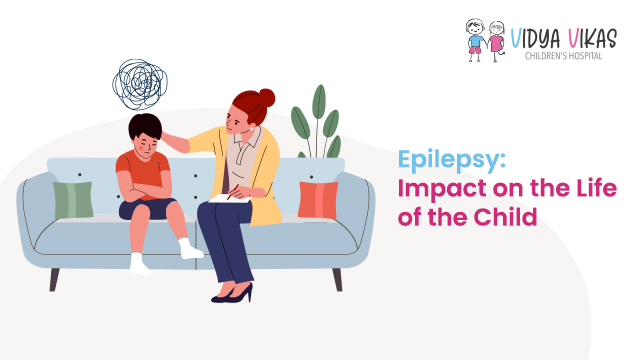


Epilepsy, a neurological disorder characterized by recurrent seizures, can manifest differently in children than in adults. Recognizing the early signs of epilepsy in children is crucial for timely diagnosis and treatment.
Epilepsy in children may present with various signs and symptoms, including:
Seizures: The hallmark symptom of epilepsy, seizures in children can manifest as convulsions, staring spells, repetitive movements, or sudden changes in consciousness.
Developmental Delays: Some children with epilepsy may experience delays in reaching developmental milestones, such as speech and motor skills.
Behavioral Changes: Epilepsy can affect a child’s behavior, leading to mood swings, irritability, or difficulty concentrating.
Sleep Disturbances: Children with epilepsy may experience sleep disturbances, including nighttime seizures or excessive daytime sleepiness.
Several factors may increase a child’s risk of developing epilepsy, including:
Family History: Children with a family history of epilepsy or other neurological disorders may be at higher risk.
Brain Injury: Head trauma, infections, strokes, or brain tumors can increase the risk of epilepsy in children.
Developmental Disorders: Children with developmental disorders, such as autism or cerebral palsy, may have an increased risk of epilepsy.
Genetic Factors: Certain genetic syndromes are associated with an increased risk of epilepsy in children.
Effective treatment for epilepsy in children focuses on controlling seizures, minimizing side effects, and improving the child’s quality of life. Treatment options may include:
Medications: Antiepileptic medications are often the first-line treatment for controlling seizures in children. The choice of medication depends on the type of seizures and the child’s age and overall health.
Dietary Therapies: Dietary therapies, such as the ketogenic diet or modified Atkins diet, may be recommended for children with epilepsy, especially those who do not respond to medications.
Neurostimulation Devices: Neurostimulation devices, such as vagus nerve stimulation (VNS) or responsive neurostimulation (RNS), may be considered for children with difficult-to-control seizures.
Epilepsy Surgery: In some cases, surgery may be recommended to remove the part of the brain responsible for triggering seizures, especially if the seizures originate from a specific area of the brain.
Despite the challenges of living with epilepsy, many children can lead fulfilling and productive lives with proper treatment and support.
With appropriate treatment and management, many children with epilepsy can lead relatively normal lives. It’s essential to work closely with a pediatric neurologist and other healthcare professionals to develop a comprehensive treatment plan tailored to the child’s needs.
At VidyaVikas Pediatric Neuroscience Center in Nashik, Gangapur, we understand the unique challenges of epilepsy in children and offer comprehensive evaluation, diagnosis, and treatment services. Our team of experienced pediatric neurologists is dedicated to providing compassionate care and support to children with epilepsy and their families.
For pediatric epilepsy treatment, trust Vidya Vikas Pediatric Neuroscience Center as the leading epilepsy center for children in Nashik, Gangapur. Contact us today to schedule a consultation with one of our expert pediatric neurologists.
1. What should I do if my child has a seizure?
During a seizure, it’s important to stay calm, protect your child from injury, and time the seizure duration. If the seizure lasts longer than five minutes or if your child has difficulty breathing, seek medical assistance immediately.
2. Are there any lifestyle changes that can help manage epilepsy in children?
Maintaining a consistent sleep schedule, managing stress, avoiding seizure triggers, and following a healthy diet may help reduce the frequency and severity of seizures in children with epilepsy.
3. How can I support my child’s emotional well-being while living with epilepsy?
Open communication, education about epilepsy, and providing a supportive and understanding environment can help children cope with the emotional challenges of living with epilepsy.
4. What should I do if my child’s medication is not effectively controlling their seizures?
If your child’s seizures persist despite medication, consult with their pediatric neurologist to explore alternative treatment options, such as dietary therapies, neurostimulation devices, or epilepsy surgery.
5. What resources are available for parents of children with epilepsy?
Many organizations, support groups, and online communities provide resources, information, and support for parents of children with epilepsy, helping them navigate the challenges and uncertainties of managing the condition